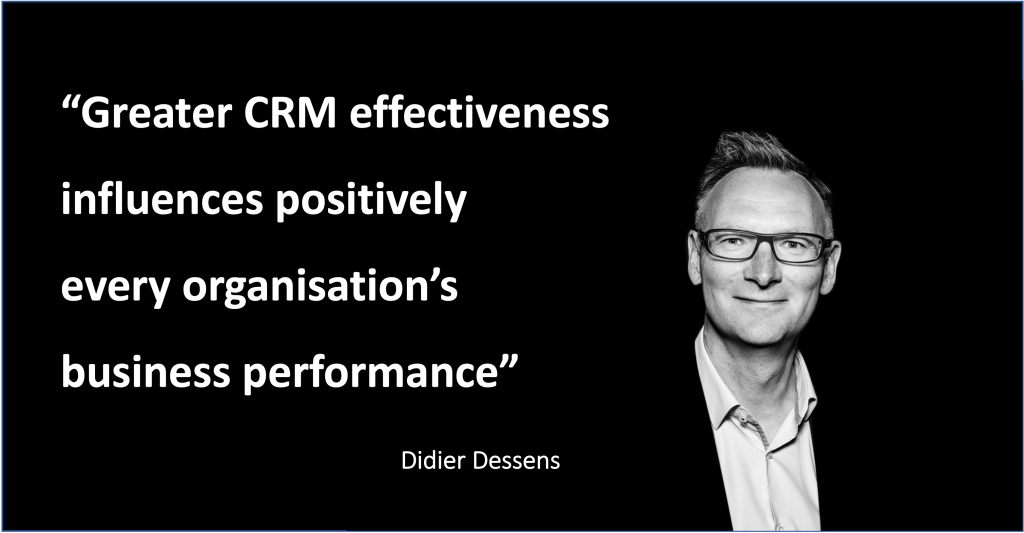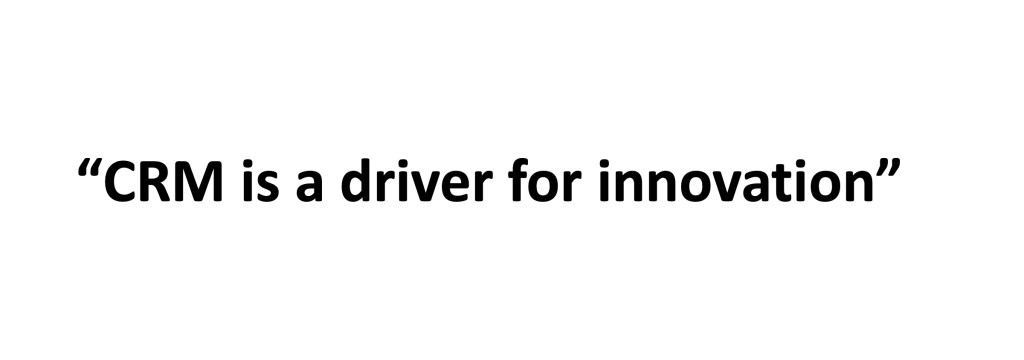Greater CRM effectiveness influences positively every organisation’s business performance
CRM is a driver for innovation. I see a strong correlation between CRM and business performance. And I strongly champion the idea that greater CRM effectiveness influences positively every organisation’s business performance.
This is evidence to me. Especially when I look at market-leading practices. I observe that many business leaders view CRM as bringing some sort of competitive edge. They leverage it to drive large-scale transformations to boost their business performance.

If I look more closely at how organizations generally approach the topic of CRM, I can see that there is some sort of concern which is related to ROI and costs. I can understand it.
Faced with the overriding reality of changes in market conditions, organizations must decide whether they should invest in a CRM initiative. And here, a manager must know as exactly as possible if the CRM project will be profitable in the long run.
This phase is tricky since we may simply be placing an arbitrary figure in the business case, with certain assumptions on future benefits.
I am familiar with such situations.
It may be useful at this point to understand one thing: To foresee the potential of such projects and how they influence an organization’s business performance, executives must take a holistic view, understand who their customers are and how efficiently they engage.
For me there are several areas of value. Areas that every top manager should look at in more detail and try to translate into tangible figures for a business case.
Let me tell seven examples that may be relevant to business executives.

CRM is a driver for innovation
Innovation is so obviously useful. But real innovation comes from fast moving markets. Changes lead to the need for an organization to be able to adapt and respond quickly.
CRM fosters strategic alignment
CRM fosters the strategic alignment and collaboration between IT and Business, between business units, between different ways of working. Organization-wide. Across siloes. This one is a no brainer. It happens all the time.
CRM feeds business strategy
Business strategies are fueled with insights coming from internal and external data sources. Firms need to know about their business environment to plan for the future. CRM solutions provide the capabilities to collect, manage, and share (strategic) intelligence data. Unfortunately, too many organizations have invested in CRM mostly for operational purposes than to also support the strategic intelligence process.
CRM boosts revenues
For example, contact centers increasingly drive sales, cross and up-sales, as one of the primary points of contact with customer. Still very much relevant.
CRM leads to simplification on the inside
One example is lead management. Efficient lead management processes streamline the capture, distribution, and qualification of leads across a multitude of channels. Less business opportunities are lost in the transition from Marketing to Sales for instance.
CRM brings agility and flexibility
CRM helps respond quicker to market changes. It helps lay out the functional components of how an organization will take advantage of new technologies and go to market.
Customer satisfaction improves
Customer satisfaction rates improves through a combination of better insights, greater collaboration internally or with partners, stronger professional ability to manage customer requests or to have advisory-oriented dialogues.
This list of potential benefits is of course “oriented”. Those are my observations. And you may also add other concrete factors or even bring pitfalls to the table. After all, why not? This is how we move forward.
And this brings me to my final point: Where do we go from here?
This question cannot be answered without reconsidering the established CRM strategies.
Inherently, it seems clear that executives must take a holistic view across their growth strategy, operating model, processes, people – employees, partners, and customers -, and systems.
Of course, every executive has a different understanding of what CRM means. Every company has a different way of measuring ROI, to look at the expected benefits, and to respond to market pressures.
But my point is: Market pressures will likely continue. To keep (or increase) their market share and grow their business, organizations must have a greater level of understanding of their customers and how efficiently, as an organization, they engage and operate.
This is what CRM is all about. Naturally.
This might also be of interest to you
CRM systems are never good enough
